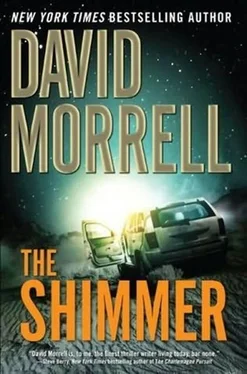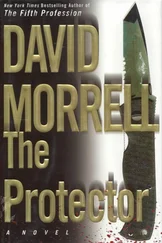“Why hasn’t word about them gotten around?” Tori wondered.
“There was a segment about them on that old TV show, Unsolved Mysteries, and a crew from the History Channel did some interviews here about five years ago. Every once in a while, there’s an item in a magazine. When that happens, we get a wave of visitors. That’s why the county set up that viewing area and the portable toilets. People made so much mess out there that it seemed better to adjust to the tourists than to ignore them-turned out to be good for business, too. But eventually, interest dies down. For one thing, the lights don’t photograph well, so camera crews get restless. Plus, a lot of visitors don’t see the lights, which is why the county put up that plaque with its warning that people shouldn’t feel disappointed if they don’t see anything.”
Harriett clicked glasses with them and sat.
Although Page made a show of sipping the tequila, he had no intention of finishing it. He merely used it as a prop to encourage Harriett to feel comfortable and keep talking.
“Chief Costigan thinks they’re probably lights from a distance, magnified by temperature inversions. But I don’t believe that,” Tori said firmly.
“You’ll hear all kinds of theories. From UFOs to ball lightning.”
“Why do some people see them and others don’t?” Page asked.
“As I said, there are all kinds of theories. A psychiatrist on Unsolved Mysteries claimed it’s a form of mass delusion, that some people want their expectations to be fulfilled while others are determined not to be manipulated.”
“I don’t believe that, either,” Tori insisted, looking at Page. “I had no expectations when I first saw the lights, back when I was ten. All I wanted was for my father to stop the car so I could run to a PortaPotty. When I came out, the lights were the last things I expected to see.”
“Fred Nolan sure didn’t have any expectations when he first saw them back in 1889,” Harriett said.
“Fred Nolan?” Tori asked.
April 5, 1889.
Nolan watched as the train’s crew lowered the spigot from the water tower and filled the steam engine’s water compartment. He scanned the few small buildings that provided shelter for the men who hauled wood from the Davis Mountains and stacked it for trains to use as fuel.
Animals bellowed in the cattle cars.
“Slide the hatches open,” Nolan told his men.
Wooden planks rumbled as hooves descended into sunlight and open air.
“Keep ’em together,” Nolan ordered.
The five hundred cattle were scrawny, purchased cheaply in Colorado after a hard winter had piled so much snow on grassland that the animals couldn’t stomp through the drifts to get at it. Many had starved to death. These that survived looked awful.
But they did survive, Nolan thought. They’re strong. They’ll make good breeding stock.
He’d met with railroad executives in Denver, arguing that this water stop in west Texas was a perfect place for the railroad to build a town and sizable cattle pens.
“Sure, the grass is spread out, but there’s more land for the cattle to graze on. They thrive if there’s an acre per animal.”
“An acre per animal?” a cigar-smoking executive scoffed. “In that case, you’d need an awful lot of land to justify the expense you want us to commit to.”
“Well, my ranch is small right now, I admit. All I have is a quarter- million acres, but I’m planning to expand.”
“A quarter-million acres?” The executive sat forward. “Good God, are you telling us you plan to be able to ship a quarter-million cattle through that water stop?”
“For starters. If you build the pens and the town, I’ll supply the cattle.”
Now Nolan looked toward where the pens would be situated, the troughs for water and hay, the permanent ramps that would lead up to the cattle cars. He imagined the town’s wide streets through which the cattle would be herded to the pens. The stores that would make it easy to get supplies for his ranch. The homes for the people who would manage the stores. Perhaps a doctor and a church. Perhaps even a saloon, carefully monitored, for although Nolan was a devout Presbyterian who’d never touched a drop of alcohol in his life, he understood the needs of the men he employed and reasoned that allowing occasional, carefully controlled recreation would make it easier for him to attract and keep ranch hands.
He admitted that his ambition was greater than his capabilities. He had the quarter-million acres, which his grandfather and father had fought against Mexicans and Indians to keep. But what he needed now was the money to buy more cheaply priced, scrawny but amazingly strong cattle. So far he had a herd of fifty thousand, but he’d need a lot more to breed them into the quarter million he’d promised.
Well, it’s a beginning, Nolan thought. Next week, I’ll head for Oklahoma. Their winter was the reverse of Colorado’s, so dry that the spring grass isn’t coming up. Ranchers’ll be culling their herds, willing to sell their worst-looking stock for pennies on the dollar. They’ll think I’m a fool, but I know anything that lived through a winter drought has got to be strong.
“Move ’em out,” he told his men.
The angle of the sun warned him that darkness would fall in five hours, and during that time, his men had to drive the cattle eight miles to the stream they had dammed, creating a pond where the cattle could stay in a group and drink. More than a mile an hour. After the long trip in the cattle cars, there was a risk that some animals might collapse before they got to the water. But after that, they’d be able to rest, to do nothing but eat and drink and grow.
They’re strong, Nolan thought. They’ve been through worse than this. They’ll get to the stream.
As it turned out, two animals died and the others didn’t reach the water until after dark, when it was more difficult to control a moving herd and the yelping of coyotes could easily have spooked them. But finally the cattle circled the dammed-up part of the stream, and Nolan told his foreman, “Keep half the men watching the herd. Tell the other half to set up camp.”
In the light of the stars and a rising quarter moon, Nolan dismounted, unsaddled his horse, put a rope around the mare’s neck, and led her to the water, where he took care that she didn’t drink too much. His legs stiffening, he guided the horse to a stretch of grass, hobbled her, and allowed her to graze. The grass was sparse enough that she wouldn’t glut herself and get sick after the water she’d consumed.
On the way to the railroad, Nolan’s men had brought firewood from the ranch house and left it near the pond. Now, in the darkness, they arranged it in three piles to build campfires.
“Mr. Nolan, what do you suppose that is?” his foreman asked, sounding troubled.
“Where?”
“Over there, to the southeast.”
Nolan stepped away from the cattle and looked at the murky horizon.
“I don’t see anything. What am I supposed to be looking for?”
“There, Mr. Nolan. Those lights.”
“Lights?” Nolan stared toward the darkness. “What lights? I don’t see… Wait a second.”
At first Nolan had thought he was looking at stars that glistened on the horizon. But suddenly he realized that whatever he saw was below the horizon. On the grassland. Twinkling. At least a dozen lights.
“Tell the men not to build the fires,” he ordered with a muted, urgent voice. “Make sure they don’t make any noise, either.”
As the foreman ran to obey, Nolan hurried to a man on horseback who was watching the herd.
“Get down. Stay low. Don’t show your silhouette. Tell the other men to do the same.”
Читать дальше












